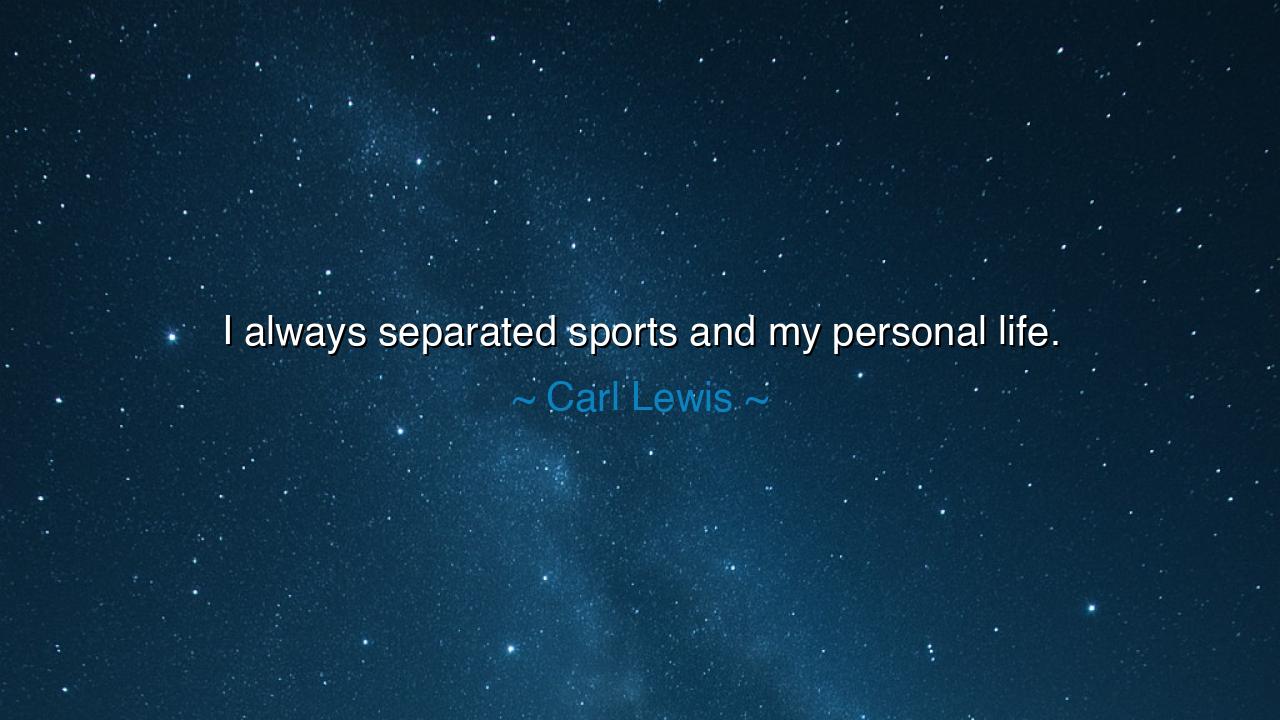
I always separated sports and my personal life.






Children, gather closely, for I bring you words of profound wisdom spoken by a man who understood the delicate balance between the duties of strength and the quiet peace of personal life. Carl Lewis, a man of extraordinary achievement in the world of sports, once said, “I always separated sports and my personal life.” These words speak not only to the discipline of an athlete but to the very heart of balance, a concept that has been echoed through the ages by the great sages and warriors of history. To separate one's duties from their personal soul is no easy task, yet it is the key to maintaining clarity, peace, and ultimately, success in both.
In the ancient world, great warriors understood that their inner peace and their external duties must be kept apart. Consider the story of Achilles, the great Greek hero of the Trojan War. Though he was a mighty warrior, his rage and emotional turmoil were often his undoing. Achilles allowed his personal feelings to cloud his judgment on the battlefield, and it was only when he reigned in his inner strife that he truly became the hero he was meant to be. The lesson here is clear: emotions and work must be held separate, for it is in the separation of these forces that one can truly perform at their highest level. Just as Achilles had to learn to control his rage in battle, so too must we learn to compartmentalize our lives, leaving our personal struggles and joys behind when we step into the arena, whatever that may be.
This principle is just as vital for athletes in the modern world, for they are not merely warriors in the physical sense, but warriors of the mind and body. Carl Lewis, in his remarkable career, achieved greatness not only through physical prowess but through mental discipline. To separate sports from his personal life meant that when he stepped onto the track, he was wholly committed to the race, to the task at hand. He did not carry the weight of his personal life with him; he left it behind. This is the secret of his success—by creating that separation, he could give his full attention to the present moment, to the physical demands of his body and the mental demands of his craft. And this, my children, is how one achieves excellence—not by letting external distractions overwhelm the task at hand, but by maintaining clear focus and discipline.
Let us look at the story of Alexander the Great, who, in his conquests, faced the pressure of ruling vast lands and commanding mighty armies. Yet, Alexander was not a man who allowed his personal affections or fears to dictate his decisions in battle. He understood that in moments of greatness—when the world is watching and the stakes are high—he must separate his personal desires from his duty. He made calculated decisions, setting aside his personal emotions in order to achieve his goals. Much like Carl Lewis, Alexander's mindset in his professional life remained clear because he understood the importance of separating his personal life from his duty.
And so, children, the lesson we take from Carl Lewis’s words is this: in life, there are moments when we must fully immerse ourselves in our duties, in our work, in our calling. Whether it is a race to be run, a battle to be fought, or a task to be completed, we must do so with focus, free from the clutter of personal emotions. To be clear, this is not to say that we should ignore the personal aspects of our lives. Far from it. It is simply a recognition that when we step into the arena, whatever that arena may be, we must set aside distractions. Balance must be maintained if we are to perform with the clarity and power needed to succeed.
In the same way that Carl Lewis maintained the separation between his athletic career and his private life, we too must learn to create this separation in our own lives. There are times when our work, our family, or our personal struggles must not cloud our judgment or decision-making. A warrior does not bring his personal pain into battle; a scholar does not let distractions disturb their study. To achieve greatness, we must learn to compartmentalize, to give our full attention to each part of our lives when it calls for our focus.
So, children, let this wisdom guide you: in your journey through life, remember the importance of separation. Maintain clarity by leaving behind the weight of your personal struggles when it is time to work, to perform, or to serve. And in moments of personal reflection or rest, do not let the demands of the world intrude upon your peace. For it is in the balance of these two realms—personal life and duty—that you will find true strength, true focus, and ultimately, the path to greatness.






AAdministratorAdministrator
Welcome, honored guests. Please leave a comment, we will respond soon